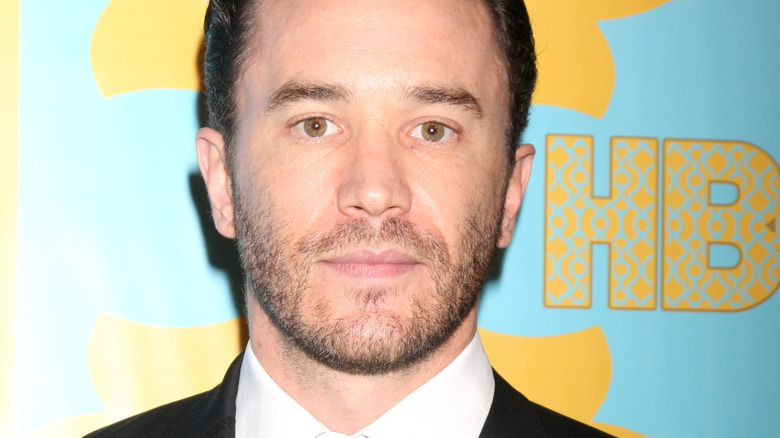How Ozark Fans Really Feel About The Show's Portrayal Of Mental Illness
It's still kind of hard to believe Netflix's hit crime saga "Ozark" is over. But just as the series seemed to pop up out of nowhere in 2017 to become a massive hit for the streamer, its end arrived almost as unexpectedly.
There was actually plenty of warning, of course. Netflix heralded the show's finale with a suitable amount of pomp and circumstance. But even series die-hards might agree a thick cloud of uncertain anguish seemed to hang over the show's final run of episodes. Then again, one could also argue that cloud was woven into the narrative fabric of "Ozark," bleeding seamlessly into many of the series' heavy central themes.
That was particularly true during the show's propulsive Season 3, when the narrative grew to include the subject of severe mental illness. That exceedingly complex subject was broached with the appearance of Wendy's oft-wayward brother Ben Davis (Tom Pelphrey), whose struggles with bipolar disorder served as an integral part of the storytelling in Season 3. In fact, Ben's struggle fueled arguably the most harrowing, and heartbreaking narrative arc "Ozark" creatives ever conjured. And fans of the relentlessly bleak series have indeed cited it in discussing how mental illness was depicted on the show.
Ozark fans are pretty blown away by the show's unflinching depiction of mental illness
To be clear, "Ozark" fans are almost universally impressed with how the show tackled the difficult subject of mental illness throughout its run, and especially in Season 3. Quite a few of those fans have taken to Reddit to praise the series for its representation. That includes u/alexthegreat98, who opened a 2020 thread with the comment with, "Thank You Ozark for Representing Mental Illness." The user went on to offer they struggle with bipolar disorder themselves before adding how affirming it was to see the condition depicted with such unflinching honesty.
They weren't the only user who felt seen by the Ben Davis character either, with u/hi-fi_lo-fi chiming in to say, "Yes! The Ben Davis character was a perfect portrayal of bipolar disorder," and u/flay-otters praising, in particular, the dexterous work of Tom Pelphrey for so vividly depicting Ben's internal and external struggles. They went on to post, "It was the first time I saw something in pop culture that captured how helpless mental illnesses can make you feel."
That said, though the comments section was overrun with similar praise, there was at least one Redditor who took umbrage in the way "Ozark" handled some its more unstable characters, with u/youcanttakemeserious stating, "My issue is that every single person with a mental illness is always depicted to the ultimate extreme of the disorder [...] I just also feel like they demonized mental illness to a sense."
Issues aside, even that user still had nothing but praise for Ben's storyline on "Ozark." As it stands, that particular arc has become a clear series highlight for many.
Tom Pelphrey wanted to be very careful in painting an accurate picture of bipolar disorder on Ozark
Ben Davis has, of course, also served as a bona fide breakout role for Tom Pelphrey. If you've seen the actor at work in "Ozark," you know much of the praise is warranted. You might also know he was rolling completely solo in what was arguably one of the best scenes from the show's entire four-season run. Per Pelphrey, in a 2020 interview with HuffPost, "I just gave over to the writing. The scenes are written in such a way that it will handle some of the complexity for you."
Still, the challenge of translating said struggle rested largely on Pelphrey's shoulders. Not surprisingly, Pelphrey studied extensively for the role to ensure his depiction of bipolar disorder was accurate as possible, telling ComicBook.com in 2020, "I mean, so yes, to understand bipolar disorder, obviously, I felt that was pretty important." The actor explained that he'd read several books in preparation, but found Kay Jamison's bravura biography "An Unquiet Mind" particularly inspiring. "The book was extremely helpful because you're simultaneously getting a very vulnerable, honest memoir, almost like reading someone's journal about their journey with bipolar," with Pelphrey adding that Jamison's own experiences as a mental health professional added additional layers of insight.
That combination of great writing, in-depth preparation, and soulful acting resulted in one of the more vivid depictions of mental illness many have ever seen on-screen. And it undoubtedly helped make Season 3 of "Ozark" a legit heartbreaker.
If you or someone you know needs help with mental health, please contact the Crisis Text Line by texting HOME to 741741, call the National Alliance on Mental Illness helpline at 1-800-950-NAMI (6264), or visit the National Institute of Mental Health website.


